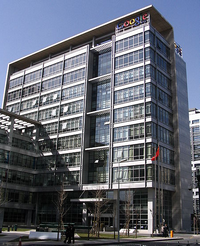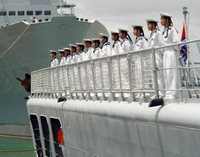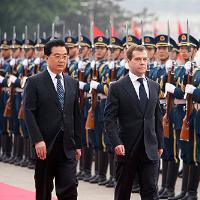Here are a few of this week’s highlights from WPR’s video section: – Minister Mizuho Fukushima, leader of Japan’s small Social Democratic Party, has rejected plansto build a new U.S. Marine base on the island of Okinawa. This video explains what ramifications this could have for Hatoyama’s coalition government. – Youth in Southern Sudan are taking up arms to protect their villages from cross-border attacks. This video shows how the young soldiers are fighting the Ugandan Lord’s Resistance Army. – A New America Foundation conversation with author Steven Hill discusses how Europe’s innovation has led to a more supportive, ecologically […]
Asia-Pacific Archive
Free Newsletter
Afghan Warlord Gulbuddin Hekmatyar shares his views on Afghan politics,the unraveling of Pakistan and foreign forces in Afghanistan. Hekmatyarsays that Pakistan has made grave mistakes by helping the UnitedStates, mistakes that will result in further national instability. Healso describes Hezb-e-Islami’s structure and power within Afghanistan.Hekmatyar claims that a majority of the country is in favor of theIslamist party.
It is no surprise that China has risen to economic preeminence, but thequestion remains, will it be able to keep up the pace? WorldFocus’Martin Savidge interviews the New York Times’ International BusinessEditor Marcus Mabry. Mabry says that the Chinese stimulus package, similar to the U.S.stimulus package, has largely been more effective than its U.S.counterpart because lenders have been instructed to lend money toindividuals and companies versus banks holding onto the money to recouplosses. That being said, there are talks of a possible real estatebubble in China, but Mabry says that no one will ever know until it’stoo late.
There’s been a lot of speculation about the mid- to long-term impact on U.S. foreign policy of the Haiti earthquake and America’s response to it. I was surprised to see how quickly the assumptions turned sour. Already last Friday, I participated in a France 24 program in which one analyst had already identified Haiti as a long-term — and major — problem for President Barack Obama, along the lines of waging the Afghanistan war and winding down the Iraq war. My sense is that this is a bit overblown. The unfolding operation in Haiti is a stability operation, not a […]

With 2009 and its economic woes behind them, the world’s major economies share a common goal for 2010: recovery. However, they also share a common problem that could stand in the way: China’s undervalued currency. A G-7 meeting in Canada next month looks increasingly likely to be a forum for discussing remedies for global currency imbalances, with a focus on the yuan. But can outsiders really do anything to influence China’s exchange rate? Or would a better strategy simply be to wait for Beijing to make the decision to revalue the yuan on its own? Before answering these questions, it […]
U.S. Secretary of Defense Robert Gates told reporters in New Delhi thatterroristgroups in South Asia have created a syndicate under Al-Qaida, with theintent of destabilizing the entire region. He says groups could try toaccomplish this goal by either provoking conflict between Pakistan andIndia or by chipping away at Pakistan’s stability from the inside. Inan effort to create a strong counter-terrorism effort in the region,Gates is encouraging the governments of India and Pakistan to worktogether in Afghanistan, with the utmost transparency, to quellsuspicions from both parties.
The leader of Japan’s small Social Democratic Party has rejected plansto build a new U.S. Marine base on the island of Okinawa. To this end,Minister Mizuho Fukushima is prepared to pull her party from Japan’scoalition government, a move that would be detrimental to PresidentHatoyama’s leadership. Fukushima does not want to hurt ties with theUnited States, rather rework and update the current relationship –with Futenma off the table.
With 2009 and its year-end Top 10 lists comfortably packed away, the Carnegie Council held an event last week to usher in the New Year with a list of what to worry about in 2010. Panelists included Eurasia Group president — and WPR contributor — Ian Bremmer; the executive director of the U.N. Global Compact, Georg Kell; the editor in chief of strategy+business, Art Kleiner; and the executive director of the World Policy Institute, Michele Wucker. Bremmer kicked things off with highlights from his recently published Eurasia Group report. Here’s a sample from his overall list, with each risk weighted […]

Turkey continues to work along different tracks in its strategy to become the “gas hub” of Europe, as demonstrated by the official visit to Ankara of Azerbaijani Foreign Minister Elmar Mammadyarov in late December. Mammadyarov’s visit should set to rest speculation about Turkey’s waning political support for the Nabucco pipeline, as well as Ankara’s supposed reorientation toward Russia. Mammadyarov was received in Ankara by Prime Minister Recep Tayyip Erdogan and President Abdullah Gul before meeting behind closed doors with his Turkish counterpart, Foreign Minister Ahmet Davutoglu. Although the details of the talks have not been disclosed, the enthusiastic declarations of […]
A brazen, multiple-target, attack in the heart of Kabul has reminded the international community that if the Taliban wants, it can infiltrate and disrupt society, even in the most protected areas. Experts say the attack, though there were relatively few casualties, is worrisome from a psychological perspective. As Hamid Karzai was swearing in members of his cabinet, blasts outside were shining light on an inept government, struggling for legitimacy. NewsHour’s Margaret Warner reports.
In an illustration of the power of inertia in international relations, reports indicate that India will go ahead and ink a $1.2 billion deal for 29 Russian-made MiG-29s. The two relevant storylines here are the decline of Russia’s defense industry and India’s budding strategic (and security) relationship with the U.S. Neither was enough to derail a deal that will also create its own inertial pull well into the future. This is worth keeping in mind when contemplating scenarios involving major shifts in strategic orientations, of the kind I tend to be fascinated by — a U.S.-Iran rapprochement, an autonomous European […]

As soon as Google publicly announced on Jan. 12 that it would no longer self-censor its search engine results for Chinese users, observers debated why the company had taken such a surprising decision. Proposed explanations included recognition that Google’s presence in China has not encouraged greater media freedoms, irritation at yet another massive hacking effort by Chinese-based computers, a lack of commercial success in the large but highly competitive Chinese market, and fears about undermining faith in the security of its emerging cloud-computing networks. Now evidence has arisen about why Google executives were so alarmed: The company experienced the nightmare […]

The leaders of the People’s Republic of China (PRC) can look forward to the new decade with considerable optimism. Last year, the PRC celebrated its 60th anniversary, with the state-controlled media taking care to trumpet the regime’s major political, economic, and military achievements. In the eyes of its leaders, the country’s rapid increase in wealth, prosperity, and prestige has, by propelling China to the forefront of global players for the first time in centuries, vindicated its present model of government, both at home and abroad. Although one can challenge that assessment, China clearly remains the world’s most populous nation and […]

Toward the end of World War II, the godfather of geopolitics, Nicholas Spykman, offered his famous analysis that was to become a rule of thumb for many strategists ever since: Who controls the Rimland rules Eurasia, and who rules Eurasia controls the destinies of the world. Spykman had a point. The two world wars of the 20th century came about largely due to attempts by European rivals to tilt the Eurasian balance of power in their own favor. Russia was always a critical component in this balance, but now, due to the country’s aging population and infrastructure, the 21st century […]
Robert Grenier, the former chief counter-terrorism official at the CIA, talks to Al Jazeera’s David Foster about the agency’s efforts abroad. Though Grenier says that in some regions terrorist groups are gaining traction, he believes nationals in those countries are becoming increasingly resistant to the groups, forcing the organizations to operate from less governed areas such as within Yemen’s borders.
Human rights advocates around the globe are cheering an announcement from Google, Inc. that it will no longer censor content in China, following a cyber attack on its infrastructure that originated there. The move could force the company’s withdrawal from the Chinese market. Google believes the goal of the attack was to access the Gmail accounts of Chinese human rights advocates. “We can only welcome the courage shown by Google’s executives. A foreign IT company . . . is standing up to the Chinese authorities, who keep clamping down more and more on the Internet,” Reporters Without Borders said in […]
